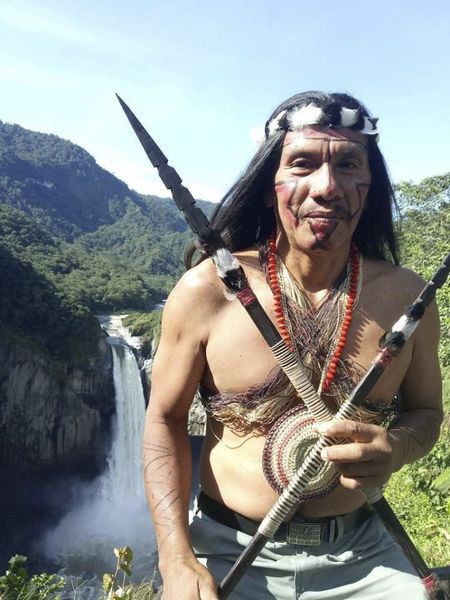Discovering New Worlds: Amazon hunter, advocate returns to VSU, South Ga.
Published 3:00 am Sunday, March 1, 2020

- Submitted PhotoMoi Enomenga, an elder of the Huaorani Tribe in Eastern Ecuador, has visited Valdosta three times.
EDITOR’S NOTE: Matthew Richard is a professor with Valdosta State University Department of Sociology, Anthropology and Criminal Justice. Here, he shares a story of international friendship and making personal connections in education.
VALDOSTA — Something remarkable happened on VSU’s campus recently that made me ponder the current state of higher education.
Moi Enomenga, an elder of the Huaorani Tribe in Eastern Ecuador, paid us a visit — his third time here. He returns to town from time to time because he likes it here. Valdostans of all backgrounds demonstrate the very finest example of Southern hospitality, and Moi revels in the kindness and hopefulness of these inter-cultural exchanges.
Moi’s first visit was back in 2006. A couple of professors had read a book titled “Savages,” about the desperate plight of the Huaorani due to the recklessness of a U.S.-based petroleum company. Oil extraction was leaving a deadly mess in its wake, affecting the water supply and the flora and fauna upon which indigenous occupants of the Amazon Rainforest depend.
Moi Enomenga, a Huaorani hunter and fisher with just a few years of schooling and no resources to speak of, emerged from the jungle to try to organize a defense of the 1,500 extant Huaorani. The tale of his effort, as told by author Joe Kane, is one of villainy and heroism, of desperation and courage.
As such, it had a magical impact on students at VSU and at both local high schools where Moi told his story. None of these young people had ever met anyone like Moi.
A former student recalled recently the impact of that classroom experience: “I first learned about Moi in 1999 in an anthropology class where one of our assignments was to read ‘Savages.’ It was then that my young eyes learned of the devastation occurring in Ecuador and of a young warrior who became the voice of his tribe.
“Moi reached a place deep in my spirit and lit a fire. I knew right then that I wanted to pursue environmental studies in order to protect our natural resources and help build communities. Upon graduating in 2002 with my BS in environmental geography, I became an environmental planner at Southern Georgia Regional Commission where my first project was to develop and implement water quality plans for our region. Now, 14 years later, I am still working with local government and striving to meet those goals.”
Hearing directly about the threat to the Amazon’s indigenous communities and to their rainforest home — the veritable “lungs of the planet” — made all of us truly aware of the interconnections of people and nature around the world, and that as consumers of gasoline, lumber and beef, we all play a significant part in this life-and-death drama.
Moi’s first visit was undoubtedly more impactful than any of the lesson plans I had on file, and when he informed me that his community was going to try to educate the world about the damage to the Huaorani territory by way of an ecotourism venture, I signed on as one of the very first clients.
I recruited another professor and seven undergraduates and we headed to the Amazon over the Christmas break in 2007. That trip was life altering for all of us, and I returned with another group the following year.
When Moi returned to campus last month, I invited him to my Introduction to Anthropology class. My current students knew nothing about him, and I wondered how they would respond. I needn’t have worried. Moi worked his magic once again, bringing to life many of the issues of greatest concern to anthropologists: the variability of sign and symbol systems; the perfidiousness of stereotypes (“Savages”); the hubris of wealthy corporations; the global political and economic forces that connect all peoples, for better or worse; and the irrepressible human spirit — and intrinsic worth — of all who inhabit this earth.
His presence and his story engaged students in a way that made everything we’ve been studying this semester seem obvious and relevant. Call it the “human touch”: Experiential learning like this — especially in the humanities — represents the very best of education; for I have no doubt that it helps one to find oneself through the proffering of novel ideas and alternate designs for living and by drawing students out of their comfort zones and having them grapple with moral dilemmas.
In short, finding oneself begins with discovering what one values.
Certainty in this regard enables one to take a firm stand on the issues that trouble humankind at this time: no more ambivalence, no more anxiety.
Unfortunately, this kind of learning happens less and less these days as those in charge of the industry opt to provide students more of a consumer experience than an intellectual and humane one. Case in point, several administrations ago, VSU’s president set aside funds for a Presidential Lecture Series, whereby VSU would invite to campus some of the country’s leading intellectuals from a variety of academic fields.
That year we heard from Wade Davis, a National Geographic Explorer in Residence, Sir Harold Kroto, a Nobel laureate in physics, Jonathan Kozol, a leading educator and author of “Savage Inequalities,” and Joel Best, a renowned statistician and sociologist. The talks were nothing short of exhilarating, bringing together into a single learning community students, faculty, and local citizens.
It’s not a stretch to say that some people — like the former student mentioned above — still talk rapturously about those lectures. Much to the dismay of our fledgling learning community, however, succeeding administrations canceled funding for the lecture series, seemingly unaware that finding oneself in college is every bit as important as finding a job.




